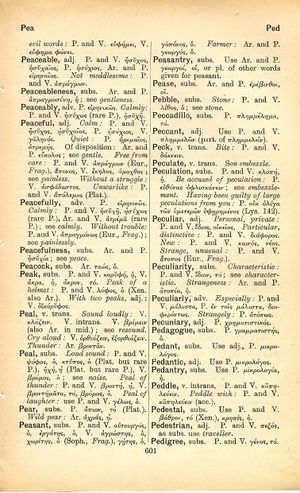peculation: Difference between revisions
From LSJ
τούτων γάρ ἑκάτερον κοινῷ ὀνόματι προσαγορεύεται ζῷον, καί ὁ λόγος δέ τῆς οὐσίας ὁ αὐτός → and these are univocally so named, inasmuch as not only the name, but also the definition, is the same in both cases (Aristotle, Categoriae 1a8-10)
(CSV4) |
m (Woodhouse1 replacement) |
||
| Line 1: | Line 1: | ||
{{Woodhouse1 | {{Woodhouse1 | ||
|Text=[[File:woodhouse_601.jpg|thumb|link={{filepath:woodhouse_601.jpg}}]] | |Text=[[File:woodhouse_601.jpg|thumb|link={{filepath:woodhouse_601.jpg}}]] | ||
P. and V. [[κλοπή]], ἡ. | ===substantive=== | ||
[[prose|P.]] and [[verse|V.]] [[κλοπή]], ἡ. | |||
[[be accused of peculation]]: [[prose|P.]] [[εὐθύνας ὀφλισκάνειν]]; see [[embezzlement]]. | |||
[[having been guilty of large peculations from you]]: [[prose|P.]] [[οὐκ ὀλίγα τῶν ὑμετερῶν ὑφῃρημένος]] (Lys. 142). | |||
}} | }} | ||
Revision as of 08:57, 20 May 2020
English > Greek (Woodhouse)
substantive
be accused of peculation: P. εὐθύνας ὀφλισκάνειν; see embezzlement.
having been guilty of large peculations from you: P. οὐκ ὀλίγα τῶν ὑμετερῶν ὑφῃρημένος (Lys. 142).

